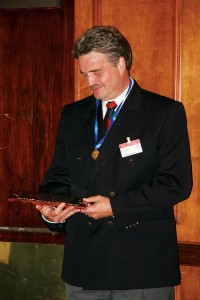USC professor named 2010 Eminent Scientist
A USC professor has been recognized by the International Research Promotion Council for his work with cancer and the human papillomavirus.
W. Martin Kast, who teaches molecular microbiology, obstetrics and immunology at the Keck School of Medicine, won the Millennium Golden International Award and was named the 2010 Eminent Scientist of the Year and North American Immunologist of the Year.

Man of the year - Professor Martin Kast receives the Eminent Scientist of the Year award for his research in human papillomavirus. - Dieuwertje Kast | Daily Trojan
“From my undergraduate through now, I have always had interest in and worked on projects having to do with antiviral immunity,” Kast said. “In the future I plan to translate our laboratory findings into clinical trials and perform these trials with a team of physicians on the medical campus.”
Knowledge about HPV can be used in researching other cancers as well, he said, such as prostate cancer and melanoma. Hopefully, Kast added, the publicity of his award will result in more opportunities for his work.
“The award shows that the international research community is appreciative of the work that I am doing in this area and sees the potential of treating woman with this deadly disease in underdeveloped countries,” Kast said. “This will also bring very positive publicity which might lead to funding agencies and more grants to help the research efforts.”
More than 500,000 women worldwide are diagnosed with cervical cancer each year, but according to Kast, cervical cancer is completely preventable in developed countries through vaccination.
Underdeveloped countries, however, are not able to afford this vaccine, often resulting in death for women with cervical cancer. Kast’s research is aimed at assisting women after they are diagnosed.
“Therapeutic vaccines work after the fact that you have a virus or cancer and it tries to manipulate your body and stimulate the immune system so it can fight the infection,” Kast said. “My research is helpful in giving treatment to cervical cancer after it has infected the body.”
Some of Kast’s research focuses on learning how HPV enters the immune system, gets into the cells and escapes from the system, and how to reverse the escape.
Kast’s 11-member research team has also contributed greatly to this project, he said.
“They physically carry out the experiments and intellectually attend meetings and develop new ideas to see if they can be used in our research,” Kast said.
Diane Da Silva, a senior research associate who has worked with Kast for 12 years, said he is very passionate about his work and research.
“What is great about Dr. Kast is that he injects his enthusiasm he has for the research into his staff, and gives us independence to develop new ideas and test our hypothesis,” Da Silva said. “He really cares for all of his students and team members and wants all of us to do our very best and succeed as independent scientists.”
Lisa Yan, a second-year graduate student studying genetic, molecular and cellular biology, said Kast’s mentorship has been invaluable during her time in his lab.
“There are often times when Dr. Kast would question me until I am speechless, allowing me to realize how much more I have to learn to become an expert in this field,” she said. “His comments and intellectual input into my research has opened my eyes to different aspects of my work. This contribution is priceless.”
